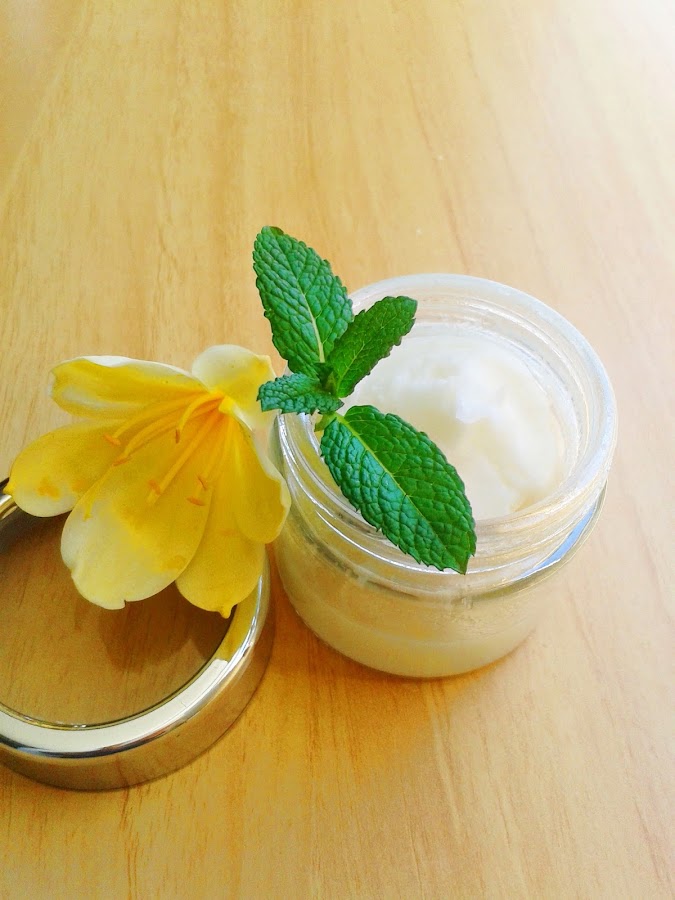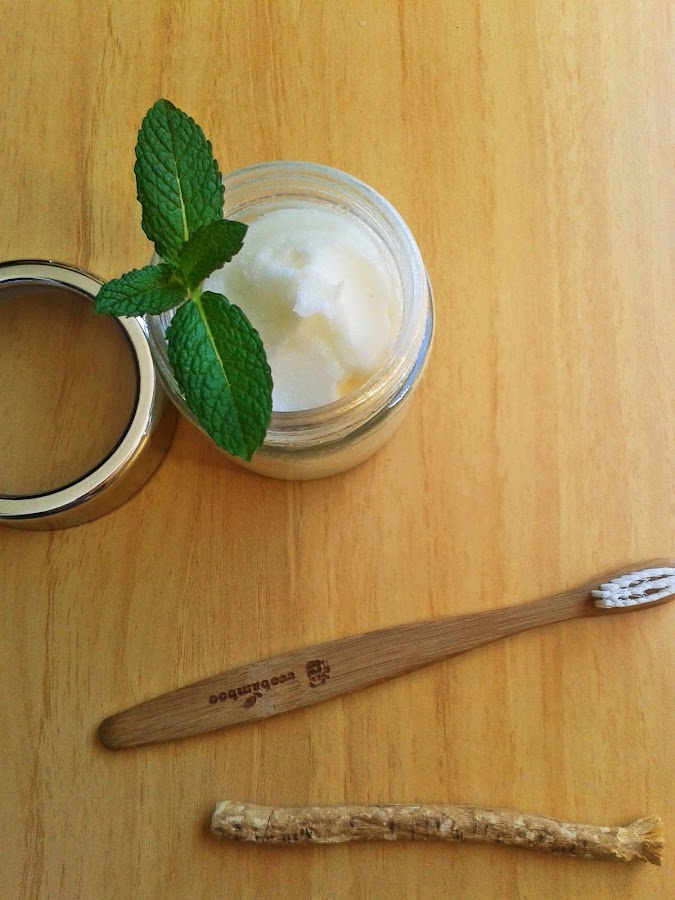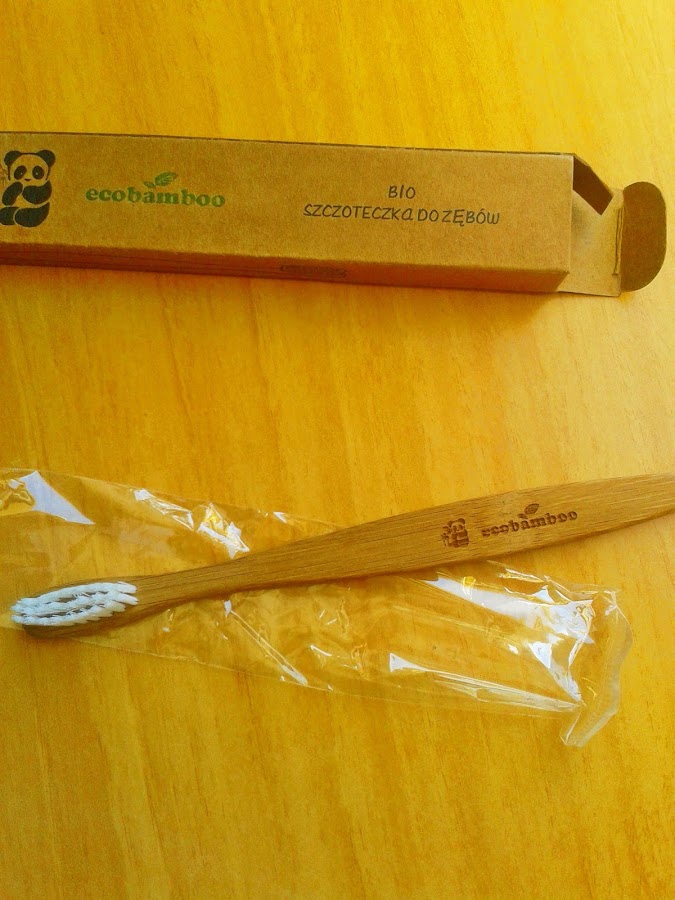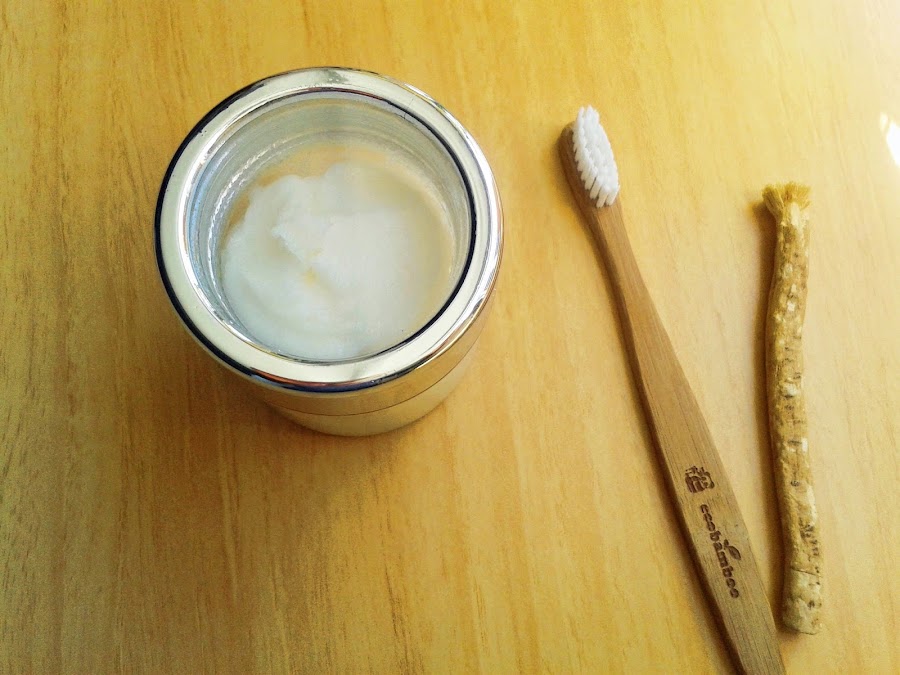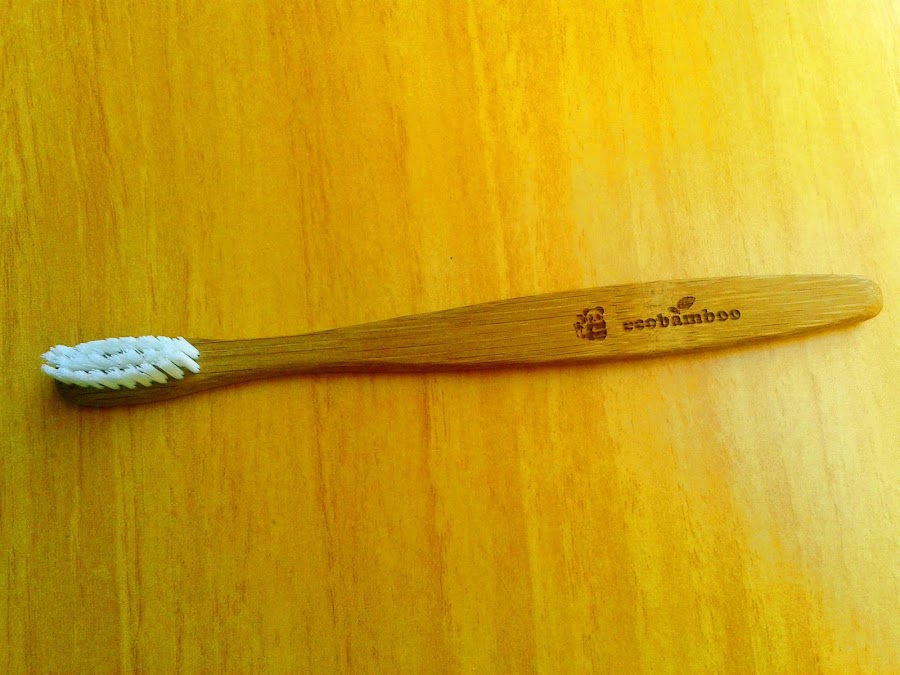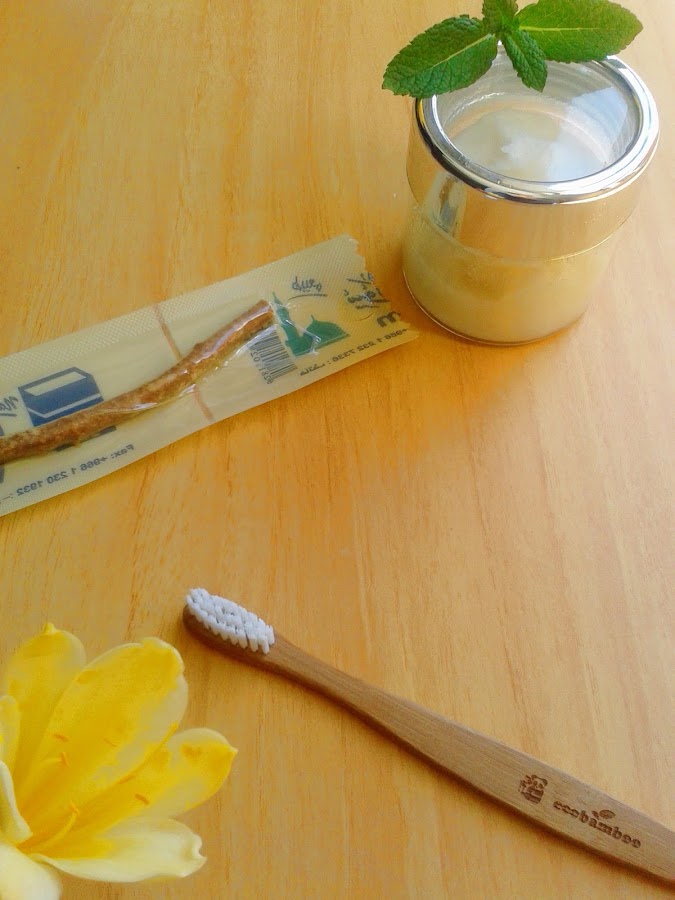Today we´re starting the week showing our best smile... and never better, because today"s post is about natural oral care products. In our mission to start getting rid of so many petroleum products, there are two that are absolutely necessary to remove from our lives: toothpaste and deodorant. Perhaps they are the products that cost us most to replace, and yet, the most benefits will bring to our lives, first, because they are one of our most daily used daily cosmetics, and second, because they are the ones that most penetrate our body and more harmful too.
homemade & natural toothpaste, sewak and bamboo toothbrush
crema dental casera y natural, cepillo de dientes de bambú y siwak
Hoy empezamos la semana luciendo nuestra mejor sonrisa... y nunca mejor dicho, ya que el post de hoy trata sobre productos naturales de higiene bucal. En nuestra misión de irnos deshaciendo de tantos y tantos productos derivados del petróleo, hay dos que son absolutamente necesarios que quitemos de nuestras vidas: el dentífrico y el desodorante. Es quizás de los productos que más nos cuesta reemplazar, y sin embargo, los que más beneficios aportarán a nuestra vida, en primer lugar, porque son los que más utilizamos a diario, y segundo, porque son los que más penetran en nuestro organismo y más perjudiciales son.Dicho todo esto, os animo a cambiar a productos naturales, y tened en cuenta que, lamentablemente, hay pocos (aunque sí muy buenos) productos naturales en el mercado, y desconfiad de cualquier producto que diga "eco", "bio", "natural"... especialmente si los venden en el super... basta leer la composición para ver qué lista tan larga de palabras y siglas raras... un tip para escoger bien es buscar los productos que tengan la menor lista posible de ingredientes y que en su mayoría estén escritos en latín (porque derivan de plantas y hierbas y eso es lo que buscamos!). Alejaos de cualquier producto que diga PEG, palabras que contengan "fenol" y "fenil", etc.
Y si os animáis, hoy comparto mi receta de pasta de dientes, que llevo utilizando desde hace casi un año y me ha dado excelentes resultados. También os mostraré dos modelos de cepillo de dientes, naturales, ecológicos y que dan un muy buen resultado.
Empecemos por la crema de dientes, yo la utilizo en un bote pequeño de cristal pero se puede poner en cualquier dosificador o tubo similar al de cualquier dentífrico (los envases se venden en cualquier herbolario y son muy baratos pero podéis utilizar un bote pequeño sin problemas).
Veréis que esta crema dental se compone básicamente de aceite de coco, bicarbonato y menta.
El aceite de coco gracias a su poder antimicrobiano, previene las caries de manera natural, elimina el mal aliento y reduce el riesgo de dientes picados y gingivitis. El bicarbonato, por su parte, es un remedio natural por excelencia para blanquear los dientes y combatir el mal aliento. Combinado con el aceite de coco, realiza una suave exfoliación, eliminando manchas y dando brillo a los dientes.
La menta es un potente antiséptico, por su olor y sabor, combate la halitosis, la sequedad bucal y reduce la incidencia de caries y gingivitis
Tenemos entonces 3 super aliados que además de sencillos de encontrar son muy económicos, digamos que por el precio de dos envases de dentífrico natural comercial compraremos todos los ingredientes para hacer botes y botes y botes de nuestra propia crema, que además es tan efectiva como cualquier marca comercial natural.
crema de dientes casera, cepillo de bambú y ramita de siwak
Crema dentífrica casera
3 cdas de aceite de coco puro virgen
3 cdas bicarbonato
10 gotas de aceite esencial de menta
unas gotas de stevia para endulzar (opcional)
Mezclamos los ingredientes para obtener una pasta, si hace falta, diluimos el aceite de coco, hasta integrar. Reservamos en un bote de cristal con tapa hermética.
La stevia es opcional, si necesitáis un sabor dulce en la crema, especialmente para los niños. En casa no la agregamos a la preparación y sabe muy bien igual. No me gustan los sabores fuertes y por eso utilizo sólo 10 gotas de aceite de menta, pero la receta original lleva unas cuantas gotas más. Si no os gusta la menta, podéis sustituirlo por otro aceite esencial (manzanilla, eucalipto, limón...).
Para su uso, simplemente extendemos una pequeña cantidad en el cepillo de dientes y utilizamos como cualquier dentrífico.
A continuación os muestro algunas alternativas al cepillo de dientes. El primero es un cepillo tradicional pero elaborado en madera y bambú, un material muy resistente y renovable, 100% biodegradable. Libre de bisfenola, que es un compuesto plástico perjudicial para la salud. El bambú tiene propiedades antimicrobianas, lo que hace que no se desarrollen bacterias.
Y por último, el siwak, quizás lo conozcáis, se utiliza en Oriente Medio y Asia desde tiempo inmemoriales, pero se ha extendido mucho por todo el mundo en los últimos años. Es una ramita de un arbusto silvestre llamado Arak, la "salvadora pérsica", que nace en suelos muy secos y cargados de minerales. Es un efectivo bactericida, elimina el sarro y los problemas de encías, como la piorrea y la gingivitis. Altamente antiséptica y calmante, se han encontrado 19 sustancias beneficiosas para la salud dental, entre otros: antisépticos naturales de acción bactericida; ácido tánico, un astringente que refuerza y protege las encías; aceites esenciales aromáticos que favorecen la salivación y digestión; vitamina C; sales minerales que endurecen el esmalte; minerales que remineralizan el esmalte; saponinas, que disuelven la suciedad; taninos y flavonoides, entre muchos otras propiedades...
El uso del siwak, además de mantener los dientes limpios y sanos, elimina la placa dental, blanquea los dientes, elimina el mal aliento, mejora el sentido del gusto y ayuda a la digestión, por mencionar algunos de sus beneficios.
Siwak
Se compra en cualquier tienda de productos árabes, librerías, carnicerías, supermercados. Para utilizarlo, lo remojaremos unas horas en agua para ablandarlo, y con ayuda de un cuchillo, separaremos unos 2cm de corteza de uno de los extremos, dando la forma de cepillo, como se aprecia en la foto. Frotaremos los dientes uno a uno con el siwak desde el borde de las encías hacia el filo de los dientes, y aclaramos. Desde el primer uso se aprecian los resultados, los dientes quedan muy suaves y limpios desde la primera aplicación.
Espero que la entrada de hoy os haya resultado interesante y que os inspire para probar algunas -o todas- de estas alternativas o cualquier otro método natural libre de fluoruro, sulfitos, sulfatos, glicerina...
Por razones de tiempo, lo que queda de este mes estaré publicando lunes y jueves, así que me despido con un fuerte abrazo hasta el jueves, deseando una muy feliz semana a todos!
homemade toothpaste, bamboo toothbrush and sewak
Today we´re starting the week showing our best smile... and never better, because today"s post is about natural oral care products. In our mission to start getting rid of so many petroleum products, there are two that are absolutely necessary to remove from our lives: toothpaste and deodorant. Perhaps they are the products that cost us most to replace, and yet, the most benefits will bring to our lives, first, because they are one of our most daily used daily cosmetics, and second, because they are the ones that most penetrate our body and more harmful too.
Therefore, I encourage you to switch to natural products, and be aware that, unfortunately, there are few natural products on the market, although you can find high quality as well, but distrust of any product that says `eco´, `bio´, `natural´... especially if they´re sold in the supermarket... just read the composition and you´ll find a long list with weird words and initials... A tip to choose well is to look for products with the minimun list of ingredients and most of them are written in Latin (because they are derived from plants and herbs and that is what we want!). Stay away from any product that says PEG, words that contain "phenol" and "phenyl", etc.
And if you´re already motivated, today I´m sharing my toothpaste recipe, which I"ve been using for nearly a year and has given me great results. I will also show two models of natural, ecological toothbrush which give a very good result.Let"s start with the toothpaste, it is rather than a cream, I store it in a small glass jar but you can keep it in any dispenser or similar to any toothpaste tube.
You will see that this toothpaste is basically composed of coconut oil, baking soda and mint.
Coconut oil due to its antimicrobial power, naturally prevents tooth decay, eliminates bad breath and reduces the risk of tooth decay and gingivitis. Baking soda, meanwhile, is a natural remedy for teeth whitening par excellence and also fights bad breath. Combined with coconut oil, makes a gentle scrub, removing stains and giving shine to the teeth.
Peppermint is a strong antiseptic, its smell and taste combats halitosis, dry mouth and reduces the incidence of caries and gingivitis
So we have 3 super allies also simple to find at the market, also very cheap, just think that for the price of two packets of commercial natural toothpaste you may buy all the ingredients to make jars and jars and jars of our own cream, which is also as effective as any natural trademark.
Homemade & natural Toothpaste
3 tbsp Pure virgin coconut oil
3 tbsp baking soda
10 drops peppermint essential oil
few drops of stevia to sweeten (optional)
Mix the ingredients to a paste, if necessary dilute the coconut oil until blended. Store in a small glass jar with a tight lid.
Stevia is optional, if you need a sweet taste in the toothpaste, especially for children. At home we don´t add it to the preparation and tastes great alike. I don´t like strong flavors and so I use only 10 drops of peppermint essential oil, but the original recipe uses a few more drops. If you don´t like mint, you can substitute for another essential oil (chamomile, eucalyptus, lemon...).
To use, simply extend a small amount on the toothbrush and use like any toothpaste.
Now I want to share some alternatives to the toothbrush. The first one, is a traditional brush but made of wood and bamboo, a highly durable and renewable material, 100% biodegradable. Bisfenola free, which is an unhealthy plastic compound. Bamboo has antimicrobial properties, which prevents bacteria from growing.
And finally, the siwak, perhaps you know it yet, from time immemorial it has been used in Middle East and Asia, but has spread extensively around the world in recent years. It is a stick of a wild shrub called Arak, "saving Persian", born in very dry soils and it is full of minerals. It is an effective bactericide, removes plaque and gum problems, such as gingivitis and pyorrhea. Highly antiseptic and soothing, with 19 dental health beneficial substances found in it, such as: natural antiseptic bactericidal action; tannic acid, an astringent that strengthens and protects the gums; aromatic essential oils that promote salivation and digestion; vitamin C; minerals that harden the enamel; remineralizes enamel minerals; saponins, which dissolve dirt; tannins and flavonoids, among many other properties...
Siwak use, while maintaining clean and healthy teeth, removes plaque, whitens teeth, eliminates bad breath, improves the taste and helps digestion, to mention a few of its benefits.
You can buy it at any arab or asian products stores, such as bookstores, butcher´s shops, supermarkets. To use, just soak the siwak for some hours to soften, and with a knife separate the bark 2cm of one end, giving the brush shape, as shown in the picture. Rub the teeth one on one with the siwak from the edge of the gums towards the edge of the teeth, and rinse. You will notice the results since the first use, teeth are very smooth and clean from the first application.
I hope you find today"s post interesting and inspires you to try out some of these alternatives, or all of them, or just start choosing any natural product free of fluoride, sulfites, sulfates, glycerine...
Due to lack of time, the rest of this month I"ll be posting on Monday and Thursday, so I send you a big hug, wishing you a very happy week and we´ll meet on another post on Thursday!



